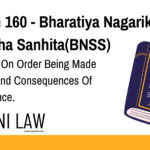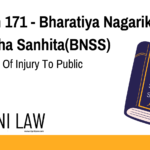Code
(1) If the Magistrate at any time after making the order under sub-section (1) of
section 164 considers the case to be one of emergency, or if he decides that none of the
parties was then in such possession as is referred to in section 164, or if he is unable to
satisfy himself as to which of them was then in such possession of the subject of dispute,
he may attach the subject of dispute until a competent Court has determined the rights of
the parties thereto with regard to the person entitled to the possession thereof:
Provided that such Magistrate may withdraw the attachment at any time if he is
satisfied that there is no longer any likelihood of breach of the peace with regard to the
subject of dispute.
(2) When the Magistrate attaches the subject of dispute, he may, if no receiver in
relation to such subject of dispute has been appointed by any Civil Court, make such
arrangements as he considers proper for looking after the property or if he thinks fit,
appoint a receiver thereof, who shall have, subject to the control of the Magistrate, all the
powers of a receiver appointed under the Code of Civil Procedure, 1908:
Provided that in the event of a receiver being subsequently appointed in relation to
the subject of dispute by any Civil Court, the Magistrate—
(a) shall order the receiver appointed by him to hand over the possession of the
subject of dispute to the receiver appointed by the Civil Court and shall thereafter
discharge the receiver appointed by him;
(b) may make such other incidental or consequential orders as may be just.
Explanation of Section 165 BNSS
Objective of the Section
Section 165 BNSS provides interim relief in highly disputed cases by allowing the Magistrate to:
- Attach property in emergency situations.
- Prevent conflicts over possession.
- Appoint a receiver if necessary.
- Transfer control to a Civil Court-appointed receiver when required.
Key Aspects
- Urgency-Based Attachment: If the dispute is likely to cause violence, the Magistrate can take control of the property.
- Neutral Custody: If neither party has clear possession, the property is placed under neutral management.
- Receiver Appointment: If needed, the Magistrate appoints a temporary receiver to manage the property.
- Civil Court Supremacy: If a Civil Court later intervenes, the Magistrate hands over control to the Civil Court-appointed receiver.
Illustration
Example 1: Land Dispute in a Village
Two parties claim ownership of a plot of agricultural land and are on the verge of a violent conflict.
The Magistrate, under Section 164 BNSS, finds that neither party is in clear possession.
To prevent violence, the Magistrate attaches the land under Section 165 BNSS and appoints a receiver to manage it until a Civil Court decides ownership.
Example 2: Market Ownership Conflict
Two business groups claim ownership of a market complex.
A Civil Court has not yet appointed a receiver, and tension is escalating.
The Magistrate, fearing a breach of peace, appoints a receiver to manage rent collection until the dispute is settled in Civil Court.
Later, when the Civil Court appoints a receiver, the Magistrate hands over control as per sub-section (2).
Common Questions and Answers on Section 165 BNSS
1. When can the Magistrate attach the disputed property?
- Answer: The Magistrate can attach property if:
- There is an emergency.
- Neither party is in clear possession.
- It is unclear who was in possession.
2. Can the Magistrate withdraw the attachment?
- Answer: Yes, if the Magistrate believes there is no further threat of violence, the attachment can be lifted.
3. What is the role of a receiver under Section 165 BNSS?
- Answer: A receiver is appointed to manage the disputed property until the Civil Court decides the rightful owner.
4. Does the Magistrate retain control over the receiver?
- Answer: Yes, but only until a Civil Court appoints its own receiver.
5. What happens when a Civil Court appoints a receiver?
- Answer: The Magistrate must transfer control to the Civil Court’s receiver and discharge the previously appointed one.
6. Can the Magistrate pass additional orders related to the dispute?
- Answer: Yes, under sub-section (2)(b), the Magistrate may pass incidental or consequential orders.
Conclusion
Section 165 BNSS ensures that land and property disputes do not escalate into violence by:
- Allowing temporary attachment of disputed property.
- Appointing a receiver if necessary.
- Ensuring a smooth transition to Civil Court jurisdiction.
This provision acts as a preventive legal measure to maintain law and order while awaiting a final judicial decision.
For further reading, check Section 164 BNSS on dispute resolution.










